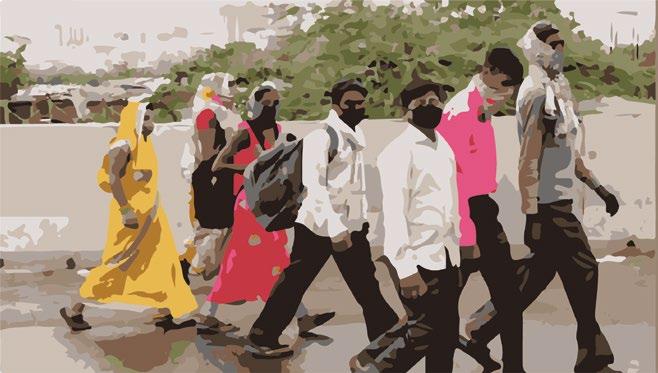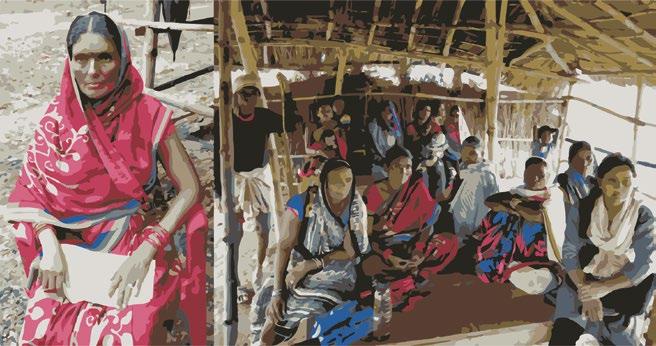
6 minute read
National Security Legislation
National Security legislations: A clampdown on human rights
There are some laws in the country that are used as a means for preventive detention i.e detaining someone to prevent them from committing an offence, in the interest of public order. The concept of preventive detention sounds perilous, especially when it gets codified into counter-terror or ‘national security’ legislation without institutional checks and balances that respect the Right to Life (Article 21 of the Indian Constitution).
While Article 22 of the Indian Constitution does unfortunately make room for preventive detention, the past decades have seen states misuse this provision to enact counter-terror laws, thus seriously affecting fundamental freedoms. India has laws like the National Security Act, 1980 (NSA); the Public Safety Act, 1978 (PSA); the Unlawful Activities (Pre-vention) Act, 1967 (UAPA) and the Prevention of Terrorism Act, 2002 (POTA), which go beyond the evil of preventive detention and target minorities and the marginalized under the garb of “protecting interest of national security”. These laws are widely criticized as being ‘draconian’, highly oppressive and seemingly imperialist in nature. They are violative of fundamental as well as basic human rights, the most important one being, the Right to Life (Article 21) that protects an individual from being deprived of his life or personal liberty, except according to procedure established by law. But when this “procedure established by law” is misused to a point where it is clearly arbitrary and done with a motive of fulfilling one’s political agenda, then it certainly needs to be screened for being in violation of the Constitution. These laws enable the government to bypass human rights to serve partisan interests.
Legislative background
As mentioned above, NSA, PSA, UAPA and before that POTA are the main laws that under the guise of safeguarding national security, detain mostly innocent individuals for democratically doing any act that is against the government or even closely displeased the authorities. Under NSA, an individual can be detained without invoking a charge against him, for a period of 12 months. This law, and the other similar laws were used to suppress the nationwide protests against the Citizenship Amendment Act (CAA) that began in December 2019, especially in the state of Uttar Pradesh, as soon as the law was passed by the Par-liament. Under the NSA, the person can be detained for 10 days without being informed about the charges against him, which is not possible to do under the usual criminal laws that are required to adhere to human rights. Very similar to the NSA, is the Public Security Act (PSA) that is applicable in the (erstwhile state) Union Territory (UT) of Jammu and Kashmir (J&K). Before August 5, 2019, J&K enjoyed a special status under the Constitution but as soon as this special status was revoked, the UT has been under a complete lockdown which restrictions on movement, communication and complete suspension of public and social life. This was followed immediately by invoking the PSA against all such individuals who were likely to organize and protest this move of the ruling government. PSA allows the authorities to keep an individual detained or under arrest for a period of 2 years without trial. The UAPA was amended in 2019 which enabled the government to arbitrarily declare individuals as terrorists. The Act, basically, punishes commission, funding and support of unlawful activities and terrorist acts. Even a vague act of questioning the territorial integrity of India is an offence under the Act. Clearly, it is up to the detaining authorities and the courts (when it finally reaches doors of justice) to define this offence. The other vague offence is causing disaffection against India; this is also likely to meet
the same fate as the previous offence. POTA was repealed in 2004, but the terrorism related provisions were inducted into the 1967 law, the UAPA and hence the legacy of the law lives on, terrorizing people. Hence, the 2004 amendment of UAPA is quite pivotal such that the voters were made to believe that POTA had been repealed while all its provisions were quietly incorporated into UAPA.
The UAPA 2004 amendment made substantial changes to the definition of ‘unlawful activity’, included the definition of ‘terrorist act’ and ‘terrorist organisation’ from the repealed POTA, and also introduced the concept of a ‘terrorist gang’. In fact, chapters IV, V and VI dealing with ‘punishment for terrorist activities’, ‘forfeiture of proceeds of
terrorism’ and ‘terrorist organisations’ respectively, were heavily borrowed from the repealed POTA. The schedule to the POTA of ‘terrorist organisations’ was also incorporated into the UAPA verbatim.2 Further amendments such that of 2008 was moved after the gunmen attacked Parliament, were regarding maximum period in police custody, incarceration without a chargesheet and restrictions on bail. The 2012 amendments to the UAPA further expanded the already vague definition of “terrorist act” to include offences that threaten the country’s economic security.3
During the monsoon session of the Parliament, the government presented data revealed that for 3,005 cases registered under UAPA between 2016-2018, only 821 chargesheets were filed.4 Current Scenario Dr.Kafeel Khan, a human rights defender, was charged under NSA immediately after he was granted bail in Uttar Pradesh, for giving a ‘provocative’ speech at an anti-CAA protest. He has been in detention under NSA since February but the same was deemed illegal by Allahabad High Court and Khan was released from The misuse of PSA saw the detention of Former Chief Ministers of J&K, Mehbooba Mufti and Omar Abdullah who were the prominent figures, among the thousands who were detained under this law. While Abdullah was released in March, Mufti walked out in October. UAPA has been increasingly invoked in response to the anti-CAA protests. It was also used to falsely implicate and arrest scholars, academicians, social activities, authors in the Elgar Parishad case.7 Those chargedunder UAPA due to anti-CAA protests and the resulting riots in North East Delhi, to name a few, were SafooraZargar (who was released in June while being 5 months pregnant), Jawaharlal Nehru University (JNU) students Sharjeel Imam, Devangana Kalita and Natasha Narwal. The activists and scholars arrested in the Elgar Parishad case include Varavara Rao (aged 80, who contracted COVID-19), Mahesh Raut, Gautam Navlakha, Sudha Bharadwaj, Anand Tel-tumbde, to name
custody on September 1.6
a few. The way forward • With due regard to human rights and natural principles of justice, these national security legislations need to be re-pealed
In the alternative, such laws that arbitrarily curb personal liberty of a person without reasonable cause, have no place in a democracy, need to be at the leastamended to include lesser periods of arbitrary detention and the legal re-quirement of Judicial
Review Committees that review arrests under such laws.
1) https://indianexpress.com/article/india/activist-gautam-navlakha-criticises-uapa-inopen-letter-before-surrender-6362016/ 2) https://thewire.in/rights/uapa-anti-terrorism-laws 3) https://thewire.in/rights/uapa-anti-terrorism-laws 4) https://sabrangindia.in/article/over-3000-uapa-cases-and-only-821-chargesheets 5) https://www.scobserver.in/court-case/association-for-protection-of-civil-rights-v-unionof-india 6 https://sabrangindia.in/article/kafeel-khans-speech-does-not-disclose-any-effortpromote-hatred-or-violence-allahabadhc 7) The Elgar Parishad case is one where activists and scholars were arrested for being connected with the event by that name organized on December 31, 2017 to commemorate 200th anniversary of the Battle of Bhima Koregaon where clashes took place. Police claims that speeches made at Elgaar Parishad were at least partly responsible for instigating violence the next day and drew out clues about the operations of a larger underground network of banned Naxalite groups, of which those arrested are being accused to be a part of.










